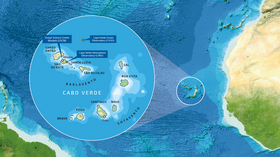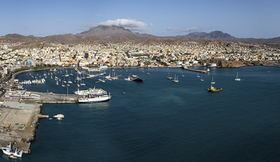
Cape Verde is an archipelago of ten volcanic islands and several islets in the Central Atlantic Ocean, located 570 km west of Senegal. The islands experience a subtropical climate and are part of the Mediterranean Basin Global Biodiversity Hotspot. Cape Verde was uninhabited prior to European colonization in the 15th century, making human influence on its native biodiversity a relatively novel factor. The rugged coastlines feature diverse habitats like rocky shores, saltmarshes, lagoons, and vegetated sea cliffs, contributing significantly to its remarkable biodiversity.
Housing and Meals

Fellows and the Graduate mentor will reside in Mindelo on the São Vicente Island for eight 8 weeks during June and July. Housing, meals and transportation in Cape Verde will be arranged by the University of Cape Verde and supported by the HERITOR program. Fellows and the Mentor will reside in guesthouses routinely rented by Uni-CV to house visiting scholars. There will be access to a laundry facility, and meals will be arranged at local restaurants and cafeterias.
Pre-Travel BIOL497/BIOL520 (Spring Semester)
HERITOR Fellows and the Graduate Mentor will enroll in a 3-credit Biological Research/Advanced Topics in Ecology course, where they will participate in weekly, three-hour-long interactive seminars. Teams of two Fellows and one Uni-CV student will be assigned to a research theme. Teams will be trained in ecology theory, conceptual frameworks in biodiversity conservation, standard research methods and skills, research proposal and project budget development, and best practices in collaborative research. Uni-CV and Biosfera mentors will join remotely at the beginning of the course and in person mid-way through the course to introduce the current status of research and infrastructure in Cape Verde, general techniques used in seashore ecosystems research, and to provide guidance on refinement of research projects. Additionally, Fellows will discuss the importance of science communication and outreach, and learn about Cape Verde geography, history, culture and customs. They will also learn basic Cape Verdean Creole through a virtual workshop, ice-breaker activities and digital games.
Summer in Cape Verde
Fellows and their Graduate Mentor will travel to Cape Verde for eight weeks (June and July). They will be accompanied during travel and the first week of their stay in Cape Verde by BSU faculty. They will work with Biosfera staff and Uni-CV faculty and students in coastal Mindelo, including Baía do Calhau and its surroundings. Teams will first review research methods and techniques they learned during the Spring semester before initiating field work. Their work will be based on survey designs developed collaboratively in the spring semester. Teams will analyze biological specimens and samples (sediments, water) collected, conduct preliminary statistical analyses, and discuss preliminary findings with Uni-CV researchers throughout their stay. They will also engage in science community outreach programs in collaboration with the House of Science in Mindelo. Fellows, Uni-CV students, the Graduate Mentor, BSU faculty and Uni-CV collaborators will meet weekly (BSU faculty will join remotely) to discuss their progress, preliminary findings, identify any possible challenges, and seek solutions. Fellows and the Graduate Mentor will reside in a guest-house located in Mindelo.
Post Travel BIOL497/BIOL520 (Fall Semester)
HERITOR Fellows and the Graduate Mentor will enroll in a 3-credit Biological Research/Advanced Topics in Ecology course, where they will work with their BSU faculty mentor and virtually with Cape Verdean students and faculty/staff to continue data analysis. Fellows will give an oral presentation at the BSU Undergraduate Research Symposium. Subsequently, Fellows will have opportunities to present at professional conferences and co-author manuscripts. They will also develop and lead outreach activities through BSU CASE programs, including Open Lab Night.
STEM Community Outreach
During their eight weeks in Mindelo, HERITOR Fellows and the Graduate Mentor will engage in three science community outreach programs. They will first observe a School Visit Program, a 2-hour experience where local teachers and their students engage in hands-on scientific activities led by staff at the House of Science, the STEM outreach center at Uni-CV. Fellows will then lead two activities, one at a local primary or secondary school, and another activity in collaboration with the Calhau Fishermen's Association in Mindelo. While leading activities, Fellows and the Graduate Mentor will also have the opportunity to discuss their research and the importance of ecosystem preservation in communities that depend on a healthy marine ecosystem for their livelihoods. Throughout their outreach work, collaborating Uni-CV English majors will assist with interpretation between English and Cape Verdean. Upon their return to BSU in the fall, Fellows will develop and lead outreach activities through BSU CASE programs, including Open Lab Night.
The HERITOR Project is funded by National Science Foundation International Research Experience for Students award #2504650.